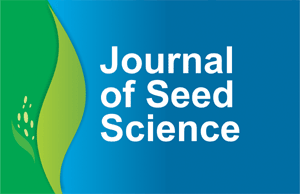Abstract:
Kale (Brassica oleracea var. acephala) has great importance due to its easy propagation, acceptability and nutraceutical properties. The aim of the present work was to make methodological adjustments to conduct the tetrazolium test in kale seeds. Pre-tests were initially carried out to assess the priming time at 20 °C for 10 and 14 hours (times defined by the imbibition curve) and methods of removing the coat of kale seeds (total removal of the seed coat; cut in the distal region to the embryonic axis; longitudinal cut along the longest axis and whole seeds). Subsequently, the most efficient methodologies were evaluated using different concentrations of the tetrazolium salt solution (0.075%; 0.2%; 0.5% and 1.0%) and times (2, 4 and 6 h) of seed immersion in the solution, using four lots. The seeds were analyzed individually and classified as viable or non-viable. The tetrazolium test is efficient for evaluating the viability of kale seeds, providing results correlated with germination. Kale seeds should be primed between paper for 10 hours at 20 °C, and the seed coat should be removed for immersion in a 0.5% tetrazolium salt solution for 4 hours at 30 °C.
Index terms:
Brassica oleracea var. acephala; priming; physiological quality

 Thumbnail
Thumbnail
 Thumbnail
Thumbnail
 Thumbnail
Thumbnail
 Thumbnail
Thumbnail
 Thumbnail
Thumbnail




